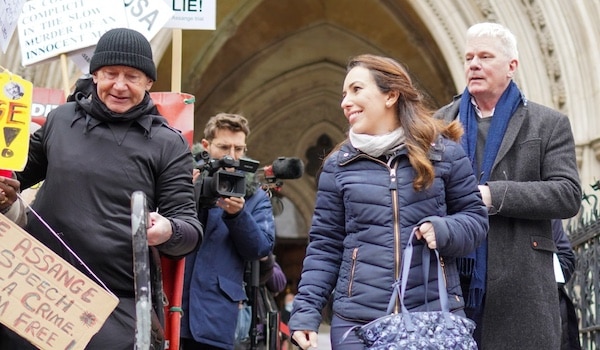A large crowd of jubilant Julian Assange supporters outside the Royal Courts in London were overjoyed at the High Court decision to prevent the award winning journalist’s extradition to the United States where he faces charges which could lead to sentences totally 175 years.
Some of the most senior judges in the land refused to accept U.S. government assurances that Assange would be extended First Amendment freedom of press rights if he were sent to trial in the U.S.
They ordered that a full appeal hearing be held in the UK to determine whether it is safe to send Assange to the U.S. or whether he might be discriminated against as a foreign national and be denied the protection of the U.S. Constitution on matters of free speech.
Inside the court room Assange’s lawyers, Ed Fitzgerald KC and Mark Summers KC, argued that the U.S. government’s assurances, requested by a previous sitting of the High Court, were so hedged with qualifications as to be unreliable.
Fitzgerald told Justice Johnstone and Dame Victoria Sharp that the U.S. government statement was ‘equivocal and downright inadequate’.
James Lewis, the hard-bitten establishment lawyer acting for the U.S. government, did nothing to dispel that impression. He told the court that Assange would have the right to ask for First Amendment protection with no undertaking that they would be forthcoming. He had the look of a man announcing that sinners might ‘have the right’ to ask for heaven on earth but not with much expectation that it would be granted.
Indeed, Lewis went further and pretty clearly flagged up that the U.S. government’s commitment to the First Amendment was far from universal and might not apply where the alleged ‘offences take place on foreign soil, involve national security issues, and where the defendant is a foreign national’. He might have shortened that thought to ‘where the accused is Julian Assange’.
The judges made quick work of this. After a 20 minute recess they came back and ruled that Assange had permission to take all this to a full hearing, thus keeping the case alive in the UK courts and preventing his immediate extradition to the U.S.
It’s not hard to see why the U.S. is so determined to avoid the Assange lawyers from raising a First Amendment defence. If they are able to do so they will argue that the U.S. prosecution is an abuse of the free press and that the WikiLeaks revelations about the Afghan and Iraq wars, and the regime in Guantanamo Bay prison, were in the public interest.
In short, they will maintain that WikiLeaks was involved in public interest journalism. This strikes at the heart of the U.S. charges which, brought against a journalist for the very first time under the 1917 Espionage Act, seek to prove that Assange was essentially acting as a spy.
This was the meaning of then Director of the CIA, Mike Pompeo’s, accusation that WikiLeaks was a ‘non-state, hostile, intelligence agency’.
And this of course is why so much is at stake in the Assange case. If the U.S. can redefine investigative journalism as spying, extra-territorially extend the reach of its Espionage Act, and indict a journalist who is not American and was not in America when the material was published then the U.S., or any other state, might be able to do the same thing to any journalist, anywhere.
All this has made the Assange case an intensely political trial from the very beginning. And its quite possible that there is a political element to today’s court decision.
President Biden has already signalled that his administration might be getting cold feet about the Assange prosecution. Donald Trump has shown intermittent sympathy for Assange depending on whether he thought it would play well with his right wing libertarian base. And perhaps neither Biden nor Trump want the increasingly unpopular Assange prosecution landing in the U.S. just as the Presidential election campaign reaches its zenith.
So there may not have been any great political pressure from the U.S. to get Assange across the Atlantic before November. Allowing the UK courts to go one more time around the town pump on this case may not have been the worst outcome for the Biden Justice Department.
But whether or not the decision of the High Court was subject to that degree of calculation, defeat has its own logic.
James Lewis’ uncharacteristically bumbling performance in court certainly gave the impression of a prosecution that has lost faith, if not interest, in the force of its own arguments.
At the very least, the U.S. government now has another legal mountain to climb.
Even more importantly, the court decision to day buys time for Assange and the campaign that supports him. With U.S. resolve weakening and the support for Assange growing the wider political needs of the U.S. establishment and the necessities of the court process are in contradiction.
For freedom of the press campaigners more time is what they need, even if it comes at a high price for Julian Assange himself now in his sixth year in Belmarsh High Security prison.
More time for campaigners means more time to build pressure for Assange’s release. The Australian government and the German Chancellor have already demanded it. So have many Latin American leaders. In the UK, across Europe, and even in the U.S. there is growing opposition.
Campaigners outside the court seemed determined to make the additional time granted to Assange count in the battle to get the extradition abandoned completely.

